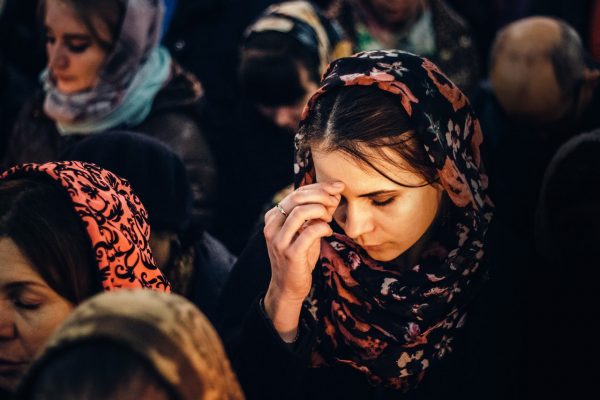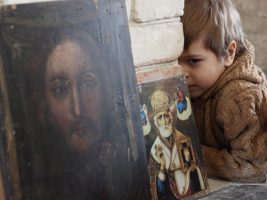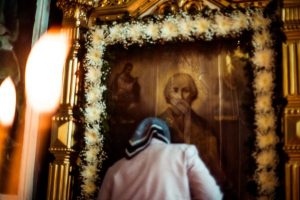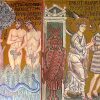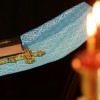HOLY THINGS FOR THE HOLY
Be holy, for I am holy
(Lev. 11:44)
At this point there is often an air of anticipation in the Liturgy. Just about every Orthodox churchgoer knows that the ‘Our Father’ ushers in the time for Holy Communion. But there is still more praying to be done:
The priest blesses the people again, and we are told to bow our heads to the Lord, and the priest prays for the “need of each: sail with those who sail, journey with those who journey, heal the sick, for you are the physician of our souls and bodies”.
This prayer just before Communion may seem out of place. It seems to have no relationship to Communion itself. Instead it addresses our needs after Communion or the needs of those who are not with us. But if you think about it, there is nothing all that strange about it being placed here. We call receiving the Body and Blood of Christ Communion because it unites us not only with Christ, but also with one another. Therefore the needs of our fellow human beings should be felt as though they are our own.
The clergy then pray:
“Give heed, Lord Jesus Christ our God, from your holy dwelling-place and from the glorious throne of your kingdom; and come to sanctify us, you who are enthroned on high with the Father and invisibly present here with us. And with your mighty hand grant communion in your most pure Body and precious Blood to us, and through us to all the people”.
The Deacon then exclaims, “Let us attend!”, and the priest, elevating the bread that is now the Body of Christ, exclaims, “The Holy things for the holy [ones]”. We are the holy ones, not by any virtue of our own, but because we are members of Christ’s Body. The full implication of this intimate union between Christ and His people is conveyed in one of the most beautiful biblical images of the Church: that of the Bride of Christ. By making Himself one with us, He has sanctified us. Through this mystical union with our Lord, we are made sharers of His holiness. Again let us return to the words of St Paul:
“Christ loved the Church and gave himself for her, that he might sanctify her, having purified her with the washing of water with a word, that he might present the Church to himself glorious, without spot or wrinkle or anything similar, but that she might be holy and unblemished”. (Ephesians 5: 25-27)
Since we are holy only because Christ is holy, the choir then sings: “One is holy, one is Lord: Jesus Christ, to the glory of God the Father, Amen.”
We are all called to be ‘holy ones’, or ‘saints’ (agioi). Holiness, or sainthood, is not the calling of a select few, but of every Christian. But the saints are not perfect beings. We do not become saints by never making a mistake, by never falling into sin; we become saints through continuous repentance.
Many of the saints lived very sinful lives until conversion. Some were guilty of murder, adultery, prostitution, idol-worship, and all manner of terrible sins. But we should not think that the saints were perfect after conversion either. Someone once asked ‘what do monks do in monasteries all day?’ The reply: ‘we fall and get up, fall and get up again’. That is repentance. That is how we become saints. This has been beautifully expressed by the American author, Phyllis McGinley:
“The wonderful thing about saints is that they were human. They lost their tempers, got hungry, scolded God, were egotistical or testy or impatient in their turns, made mistakes and regretted them. Still they went on doggedly blundering toward heaven” (1)
Still, the saints, while attaining the likeness of God, never ceased to be who they were. The greatest misconception about sanctity or sainthood is that to be a saint we must give up our own personalities. People tend to think that to be a saint one must become a sheepish, humourless person, with no idiosyncrasies or personal tastes or interests. But anyone who cares to spend time reading about the lives of saints will notice that while they may have much in common, they are also very different. As C. S. Lewis aptly wrote: “How monotonously alike all the great tyrants and conquerors have been: how gloriously different are the saints” (2). Similarly, Metropolitan Kallistos of Diokleia writes: “The saints, so far from displaying a drab monotony, have developed the most vivid and distinctive personalities. It is not holiness, but evil which is dull”. (3)
While each of us have our own unique personality and charisma, the true personhood of each person is distorted by sin. We are not to accept ourselves blindly as we are, with all our faults and shortcomings, warts and all. Rather, we are to become what we truly are. What does this mean? It means that my true self can only be discovered by cutting away the sin which distorts my true personality. The saints are therefore those who possess the fullness of personhood, who have the truest, purest personalities. The holier we become, the more sin is cut away, the more of our true selves we discover.
____________________________
1 Saint-Watching, Viking Press, NY, 1969, pp.5-6
2 Mere Christianity, Harper Collins 2002, p.226
3 Timothy Ware, The Orthodox Church, Penguin 1997, p.243












